In Progress
The Intellectual World War: The CIA’s Failed Attempt to Kill the Idea of Communism
With Jennifer Ponce de León. Revolutionizing Aesthetics: Composing a World Beyond Art. New York: Columbia University Press, Series “New Directions in Critical Theory,” forthcoming in 2022.
Published
Nota bene: excerpts from some of the books listed below are available for download here
Contre-histoire du temps présent: interrogations intempestives sur la mondialisation, la technologie, la démocratie. Paris: CNRS Éditions, 2017.
Commentaires
« Le propos de l’ouvrage est ambitieux. Au vu de l’ampleur des sujets et des références qu’il brasse, ce livre apporte une contribution remarquable à la pensée critique contemporaine […la suite] ». — Giovanni Campailla, Revue française de science politique
« Interrogations intempestives sur la mondialisation, la technologie, la démocratie» : le sous-titre cite les trois notions qui, mixées, forment ce qu’on pourrait appeler la vision courante du temps présent. Mais on sait qu’à côté de cet «imaginaire historico-politique» très répandu et hégémonique, existent aussi des «pratiques alternatives de création du monde», des «écologies technologiques rivales» et des «gouvernances plus dignes de la réputation du nom de démocratie». Pourquoi ne s’imposent-elles pas, alors que beaucoup d’Etats qui se disent démocratiques ne le sont pas, que dans la «nouvelle ère technologique» n’entre pas près de la moitié de la population mondiale (43,4 %), et que la mondialisation triomphante d’une part exclut le sixième de la population planétaire qui vit dans des bidonvilles, et, d’autre part, fait revenir toutes les richesses à une infime minorité ? L’ambition de Gabriel Rockhill, professeur de philosophie à l’université Villanova (Pennsylvanie) et «fondateur de l’Atelier de théorie critique à la Sorbonne», est d’aider à «reconfigurer l’actuel processus de fabrication collective d’un cosmos», et de forger les outils théoriques «permettant d’aborder tout autrement la problématique de l’actualité ». — Robert Maggiori, Libération (cliquez ici pour lire la recension dans Libé).
« Cette contre-histoire du temps présent n’est donc pas uniquement une invitation à mettre en cause une image consensuelle du monde contemporain et de ses maîtres-mots. Elle vise à inciter le lecteur à s’interroger sur les structures théoriques ainsi que sur les pratiques politiques et économiques qui produisent une certaine image du monde (où la démocratie serait en l’occurrence systématiquement perçue comme étant l’apanage de l’Occident). Il s’agit ainsi de favoriser une reprise en main de la construction de notre histoire plurielle et profondément hétérogène, comme un certain nombre d’actions micro-politiques et de mouvements sociaux le font valoir un peu partout à travers le monde […la suite] ». — Pierre-Antoine Chardel, Esprit
« Le livre de Gabriel Rockhill apporte une contribution très éclairante, et stimulante, à la réflexion sur le temps et l’histoire à partir d’une démarche originale. La notion de contre-histoire remet en question l’idée d’un seul et unique présent, qui se définirait par un concept unique ou des caractéristiques communes. D’emblée, l’auteur insiste sur le fait que sa “contre-histoire” ne vise pas à la singularité. Outre la réflexion qu’il propose autour de l’histoire et de l’actualité, l’ouvrage invite à reconsidérer la méthodologie historique de façon à en faire un “phénomène multidimensionnel”, c’est-à-dire bien loin d’une conception de l’histoire temporelle […la suite] ». — Suzanne Dumouchel, Lectures/Liens socio
« Rockhill nous propose un pari très alléchant : déconstruire l’idée même du présent au singulier, afin de mettre au jour les grands schèmes prétendant cerner le sens de l’histoire. Il insiste pour cela sur la pluralité des dimensions de l’histoire (temps, espace, société). Le but de ses analyses, qu’il qualifie d’ « intempestives », est, en rendant manifeste la contingence d’une définition épocale du présent, de dégager un espace pour des ordres historiques nouveaux, n’appartenant pas à une vision consensuelle du monde […la suite] ». — Juliette Monvoisin, Actu Philosophia
English edition: Counter-History of the Present: Untimely Interrogations into Globalization, Technology, Democracy. Durham, N.C.: Duke University Press, 2017.
Endorsements
“A high level polemic attacking the current enthusiasm for the notion of globalization—which Gabriel Rockhill regards as a feature of the political imaginary of our time—Counter-History of the Present will be discussed alongside work by Jameson, Harvey, and Lyotard.” — Andrew Feenberg, author of, The Philosophy of Praxis: Marx, Lukács, and the Frankfurt School
“In an era that, according to Lyotard, was supposed to have seen the end of the grand narratives, a grand narrative is spreading according to which globalization, technological development, and democracy are irresistibly marching forward in step. Gabriel Rockhill refutes this apologetic discourse not simply by appealing to growing social polarization, to shantytowns condemned to backwardness, to the toppling of democratically elected governments established by self-styled champions of democracy. Counter-History of the Present is also an occasion for critical reflection on a series of theoretical categories (beginning with that of history) that dominant contemporary thought employs in an apologetic and often Eurocentric sense. In this way, Rockhill’s book is thus an important reference point for understanding and transforming the present.” — Domenico Losurdo, author of, War and Revolution: Rethinking the Twentieth Century
“Rockhill has written a provocative and highly readable book (indeed, it is even something of a page-turner). […] What is arresting about the book is the aplomb with which Rockhill goes about this task of disclosing the contingency of the present political imaginary. A review of this length cannot do justice to the political force of this critique. But that force, in general terms, lies in the relentless exposure of neoliberalism’s flattening out of ‘time, space, and society.’ If the force of political critique is not to be found in the revelation of a single reality marked out by being ‘now’ – which would be simply to recapitulate the homogenizing and destructive disposition of neoliberal practices of government – it may be located in the recognition of the multiple and contingently related realities of time, space, and social relations. A political theory that is sensitive to the way in which political imaginaries are constituted in and can be challenged through the practices connected across these realities, is likely to have a greater impact on those practices than one that busies itself with the fruitless search for a universal ideal of a democracy whose time can never come, precisely because its place lies outside of time, space, and society… [read more]” — Jason Edwards, Contemporary Political Theory
Interventions in Contemporary Thought: History, Politics, Aesthetics. Edinburgh: Edinburgh University Press, 2016.
Endorsements
“These timely interventions challenge us to rethink the role and influence of scholarly discourse and critique. Gabriel Rockhill has developed a highly original, ‘conjunctural’ approach, which consists in reading the works of the French cultural critics and philosophers that are at the core of his expertise, according to a judgment of relevance and urgency that is part of our own historicity as critics and academics. These sharp readings of Rancière, Derrida, Foucault and Badiou are therefore part of a welcome call to arms to revitalize and politicize Anglo-American cultural scholarship.” — Giuseppina Mecchia, University of Pittsburgh
“Rockhill issues a timely critique of continental philosophy. […] [His] critique of Eurocentrism is refreshingly nuanced and resists falling into an overly facile binary of oppositions—geographic or otherwise—which then demonizes Europe and seems to assume that ‘Europe’ has a stable, unchanging center… [read more]” — Cynthia Nielsen, University of Dallas
Radical History & the Politics of Art. New York: Columbia University Press, Series “New Directions in Critical Theory,” 2014, p. 288.
Endorsements
“In this passionate and rigorous meditation on the politics of art, Gabriel Rockhill argues that neither art nor politics can be founded ontologically. This lack of transcendence brings a saving grace: understood as a historical field of collective negotiations, art recaptures its critical edge, activist agency, and social relevance.” — Jean-Michel Rabaté, University of Pennsylvania
“In this invaluable study, Rockhill vanquishes the myth that either there is some privileged moment—of form, content, or effect—uniting art and politics or there is none.With subtlety and analytic rigor, he demonstrates that the nexus connecting—or separating—art and politics is always bound to the dense weave of social practices located at concrete historical times in specific geographical locales. Along the way, Rockhill provides a scintillating new analysis of the avant-garde and the most acute analysis of Rancière’s aesthetic theory I have come across. Anyone interested in the question of art and politics will want to read this book.” — J. M. Bernstein, New School for Social Research
“Rockhill sets forward a political philosophy of aesthetics that is at once sensuous and pragmatic. This book will make a strong contribution to a practical appreciation of aesthetics and politics.” — Tom Conley, Harvard University
“In this bold and erudite intervention into twentieth-century controversies surrounding art and politics, Rockhill dissolves a whole series of reifications, essentialisms, and other symptoms of magical thinking in a bath of ‘radical historicism.’” — Kristin Ross, New York University
“To isolationist theories and concepts, Rockhill opposes an energetic interventionist strategy that is particularly welcome in the present field of concept-formation.” — Jean-Pierre Cometti, University of Provence
“Elegantly written, informative, and never less than provocative. The result is a radical voice long unheard in the field of theoretical discourse on art.” — Ádám Takács, Eötvös Loránd University Budapest
“Rockhill’s book is a polemic against the various theoretical presuppositions and postures, which fatally misconstrue the relevant factors for assessing the actual agency of aesthetic practices. It is also an assertive defence of the ‘politicity’ of these practices…. [His] book is important because it gives exemplary attention to the factors that a competent approach to this area needs to consider… [read more]” — Alison Ross, Notre Dame Philosophical Review
“One welcomes [an] ambitious, iconoclastic work like Gabriel Rockhill’s Radical History and the Politics of Art… [read more]” — Andrew Weiner, Radical Philosophy
“Rockhill’s ambitious and erudite Radical History and the Politics of Art covers a sizable and variegated terrain… [read more]” — Pavel Lembersky, H-Socialisms
“The basic claim that ties this engaging essay collection together is that past interpreters of the relationship between art and politics err in seeing the relationship in terms of two independent domains that exist prior to the relationship between them… [read more]” — C.R. McCall, Choice
“Radical History is an engagingly written book that is full of insight, and which judiciously and forcefully combines readings of some of the most cited critics on art and politics in the twentieth century. As such, it makes a new, demanding inquiry into the appropriate methodology for rethinking politicized aesthetic practices… [read more]” — Sophie Seita, Modernism/modernity
“Radical History and the Politics of Art invites us to abandon many of the myths upon which debates on art and politics have relied for decades. The book successfully breaks with the binary logic behind the majority of studies on this subject and puts into question the widely accepted theory of aesthetic autonomy. Rockhill’s insightful critique of Jacques Rancière’s thought, his valuable reevaluation of the politics of avant-garde art, and his numerous concrete examples drawn from a variety of artistic traditions and commonly overlooked arts such as architecture, ensure that this work will quickly become a versatile reference. Overall this is a stimulating and forcefully argued book that clears the ground for future scholarship on the social politicity of art… [read more]” — Ioana Vartolomei Pribiag, SubStance
“Rockhill’s project is ambitious and very worth the while in that it forces us to struggle with what we take for granted: the relationship between ‘art’ and ‘politics.’ His work poses quite a challenge… [read more]” — John Randolph LeBlanc, Clio: A Journal of Literature, History, and the Philosophy of History
Logique de l’histoire: Pour une analytique des pratiques philosophiques. Paris: Éditions Hermann, series “Hermann Philosophie,” 2010, p. 534.
Co-edited with Alfredo Gomez-Muller, in collaboration with S. Benhabib, N. Fraser, J. Butler, I. Wallerstein, C. West, W. Kymlicka, M. Sandel and A. Honneth: Politics of Culture and the Spirit of Critique: Dialogues. New York: Columbia University Press, Series “New Directions in Critical Theory,” 2011, p. 288.
Endorsement
“A book full of insights. Ten of the world’s most important critical theorists reflect on the intersections of biography, history, and theory and the interviews shed new light both on their thought and on the process of thinking.” — Craig Calhoun, New York University
French edition of Politics of Culture and the Spirit of Critique, with slight modifications: Critique et subversion dans la pensée contemporaine américaine: Dialogues. Paris: Éditions du Félin, 2010, p. 192.
Spanish edition of Politics of Culture and the Spirit of Critique, with slight modifications: La teoría crítica en Norteamérica: Política, ética y actualidad. Medellín: La Carreta Editores, 2008, p. 164.
Co-edited with Pierre-Antoine Chardel: Technologies de contrôle dans la mondialisation: Enjeux politiques, éthiques et esthétiques. Paris: Éditions Kimé, 2009, p. 207.
Co-edited with Philip Watts: Jacques Rancière: History, Politics, Aesthetics. Durham, North Carolina: Duke University Press, 2009, p. 368.
Edited and Co-translated with John V. Garner and the Villanova French Translation Workshop: Cornelius Castoriadis. Postscript on Insignificance: Dialogues with Cornelius Castoriadis. London: Continuum Books, 2011, p. 160.
Edited and Translated: Jacques Rancière. The Politics of Aesthetics. London: Continuum Books, 2004, p. 112.

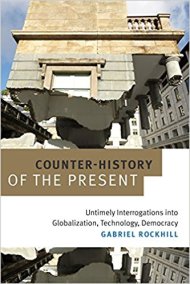
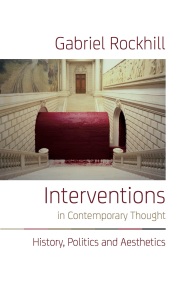
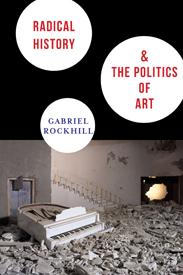
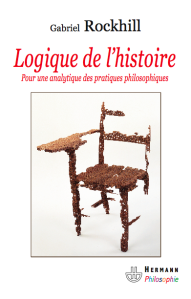


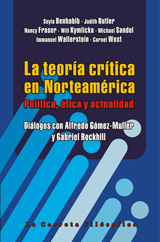
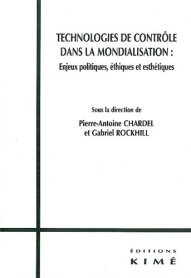



Pingback: Are Fascism and Liberalism Partners in Capitalist Crime? – Gabriel Rockhill – January 28, 2024 10:30 AM Pacific Time | ICSS-NPML